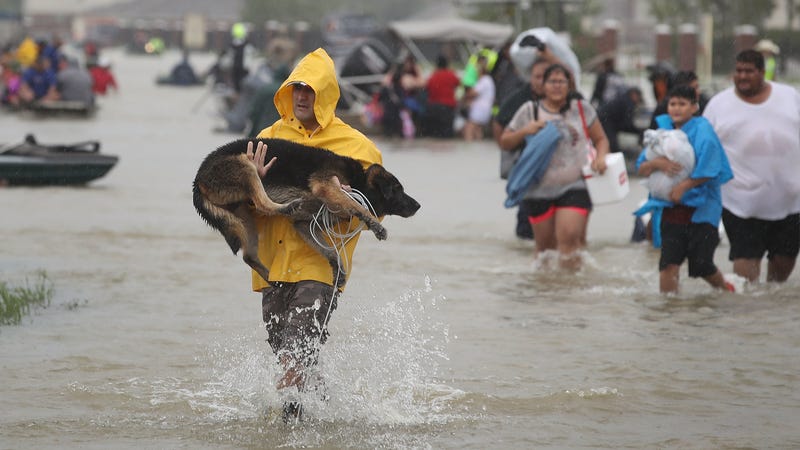 Photo: Getty
Photo: Getty
Extreme rainfall and flooding from Hurricane Harvey has left thousands in Houston and surrounding communities stranded. Some parts of the city have experienced over 40 inches of rain, and forecasters say that number is expected to rise over the coming days. Currently, the storm has repositioned itself in the Gulf of Mexico, where it will collect more moisture before striking land again. When it does, some areas of Texas and Louisiana could see an additional 20 inches of rain. On top of all this, flash flood warnings are still in effect as of this morning.
Floodwaters pose many immediate threats to people, animals, and property. According to reporting by the Washington Post, officials warn that roughly 30,000 people will be forced from their homes across Texas and Louisiana. But there are less obvious and equally dangerous health risks associated with floodwater—including exposure to potentially harmful chemicals. Some Houston residents are already reporting an “unbearable” chemical smell in certain areas that could be related to the city’s oil refineries, gas facilities and chemical plants.
Renee Funk, Emergency Management Director at the Centers for Disease Control, told Gizmodo that folks who come into contact with floodwaters must take precautions to make sure they aren’t impacted by anything the floodwaters might have dredged up, from weed repellant to animal feces.
“Chemicals can certainly be in the water,” she said. “A lot of times, people keep pesticides in their garages. When that floods, those containers are floating down the street and so if people come into floodwaters at all, they need to shower and wash their hands and get it off of them as soon as possible.”
There’s also a risk of carbon monoxide poisoning from generators left on in garages. Funk said this is tragically common in any extreme flooding situation.
“Initially in this phase of active flooding…we’re concerned about carbon monoxide poisoning from portable generators,” she explained. “The floodwaters lead to power outages and unfortunately, there will be people who die from this kind of poisoning I’m sure.”
The public health situation with regard to floodwater is so serious that public health officials in Texas are urging Houston-area residents to get Tetanus shots immediately, according to NPR. Fecal matter floating in flood water could easily infect wounds and pose other threats to people who drink water out of desperation. Gizmodo has reached out to the Texas Department of State Health Services and Houston’s Public Health Department for more information and will update this post if we hear back.
In some cases, standing water can also pose a risk for insect-borne illnesses, as it can act as a breeding ground for mosquitos and more. But Funk says that’s not an immediate threat.
“Initially, the flooding helps wash away the mosquito larvae and so it’ll take a couple of weeks for mosquitos to come back,” she said. “At that point, there will need to be some mosquito control.”
While the end of this cataclysmic storm is finally in sight, the next few days will undoubtedly be hell, especially for the thousands of folks still seeking rescue. For more information on how to stay safe after a hurricane, you can check out the CDC’s resources here. If you are in Texas and seeking medical attention due to the storm, you can find help here.